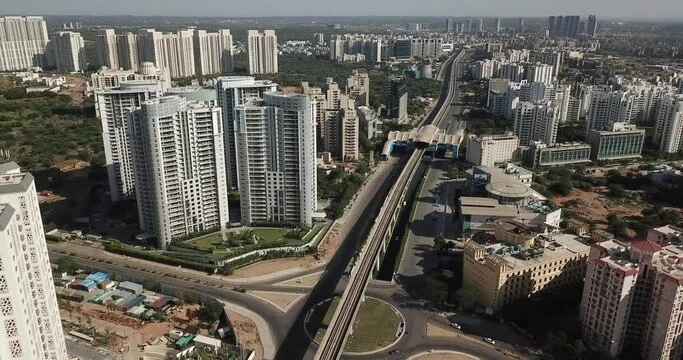Table of Content
▲
According to a recent survey by the Department of Town and Country Planning (DTCP), about 7,500 properties in DLF Phases 1 to 5 in Gurgaon are violating construction rules. Examples of these violations include unauthorized building projects, unapproved structural alterations, and unlawful business operations. After a residents' welfare group (RWA) petitioned the Punjab and Haryana High Court for strict action against these infractions, the court ordered the survey to be conducted.
Key Findings of the Survey
The DTCP survey uncovered a variety of building code violations, including:
1. Unauthorized Commercial Activities
Conversion of residential spaces into commercial establishments such as:
- Shops
- Offices
- Eateries
- Paying guest accommodations
- Boutiques
2. Unapproved Structural Modifications
- Alterations made post-issuance of occupation certificates have been flagged as non-compliant.
- These findings underscore a growing issue of non-compliance in one of Gurgaon’s most premium residential localities.
Also Read: Housing Sales Across Top Eight Cities Touch 3.5 Lakh Mark in 2024
Enforcement Actions Underway
To address these violations, the DTCP has initiated several corrective measures:
1. Issuance of Show-Cause Notices
- DLF Phase 3 property owners have received over 1,100 show-cause notices.
- Notices are also being visibly pasted on properties to ensure compliance.
2. Revocation of Occupation Certificates
- As a result of violations of building codes, the occupancy certificates for 81 homes constructed on Economically Weaker Section (EWS) plots in DLF Phase 5 have been canceled.
3. Expansion of Enforcement Measures
- DTCP plans to take similar actions in other residential areas in the coming weeks.
Table: Summary of Enforcement Actions
|
Phase |
Number of Notice Issued |
Certificates Revoked |
|
DLF Phase 3 |
1,100 |
Pending |
|
DLF Phase 5 |
Pending |
81 |
|
Other Phases |
Planned |
Planned |
"Continuing the survey. Some properties have already been found in violation," said Amit Madholia, district urban planner (Enforcement). Along with this, he added, The court order has to be followed strictly.
Permissible Usage of Residential Properties
The DTCP has clarified the permissible usage limits for residential properties to curb misuse:
Commercial Usage Guidelines
Up to 25% of the ground floor area of a residential property can be used for specific commercial purposes, such as:
- Chartered accountancy offices
- Clinics
- Property dealing offices
Permission Fees and Duration
- Permissions are granted for five years, subject to a fee of ₹60,000 under the no-nuisance rules.
- Despite these guidelines, many property owners have exceeded permissible limits, prompting stricter enforcement measures.
High Court Directive and Next Steps
The continuing survey and enforcement measures are consistent with the orders given by the Punjab and Haryana High Court. The DTCP anticipates presenting a comprehensive report regarding its progress at the upcoming court session scheduled for January 10, 2025. The High Court’s proactive engagement highlights the significance of tackling these violations.
Impact on Urban Development
The identified violations not only compromise the integrity of residential zones but also disrupt planned urban development. Illegal commercial activities and unauthorized constructions in Gurgaon’s prime localities have raised concerns among residents and authorities alike.
Objectives of DTCP’s Enforcement Drive:
- Ensure Compliance: Uphold property laws and regulations.
- Address Misuse: Resolve issues arising from unauthorized activities.
- Promote Sustainable Development: Foster planned urban growth and harmony.
By taking decisive action, the DTCP aims to restore order and protect the integrity of Gurgaon’s residential neighborhoods.
The DTCP’s survey has exposed significant challenges in maintaining compliance with building codes in Gurgaon’s DLF Phases 1 to 5. Backed by High Court directives, the enforcement measures mark a critical step toward addressing these issues and fostering accountability among property owners.
As authorities work toward sustainable urban development, it is imperative for property owners to adhere to the rules and regulations, contributing to a well-planned and harmonious living environment. The DTCP’s efforts aim to ensure that Gurgaon remains a benchmark for modern and orderly urban growth.
Also Read: MHADA’s New Amnesty Scheme: A Relief for Mumbai’s Housing Societies






_1771582392.webp)
_1771577585.webp)
Ans 1. The DTCP identified 7,500 properties in DLF Phases 1-5 violating construction rules, such as unauthorized building projects and illegal commercial activities.
Ans 2. Violations include unauthorized commercial activities (shops, offices) and unapproved structural changes post-occupation.
Ans 3. DTCP is issuing show-cause notices, revoking occupation certificates, and expanding enforcement to other areas.
Ans 4. Up to 25% of a ground floor can be used for commercial purposes like offices or clinics, with a ₹60,000 fee for 5 years.
Ans 5. These actions aim to:Ensure compliance with property laws and regulationsAddress misuse of residential properties for unauthorized commercial activitiesPromote sustainable and planned urban development in Gurgaon’s residential areas
Ans 6. The violations disrupt the integrity of residential zones and hinder planned urban development. Unauthorized commercial activities and illegal constructions can lead to congestion and a decline in the quality of living for residents.
Ans 7. Property owners who receive a show-cause notice from the DTCP must provide a valid explanation for the violations. If no satisfactory response is given, further legal actions, including penalties or revocation of occupation certificates, may follow.
Ans 8. Follow building codes, avoid unauthorized changes, and ensure commercial use complies with the 25% limit.